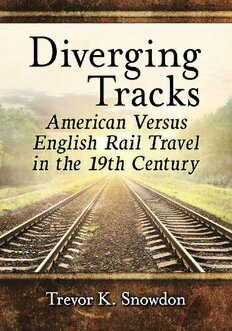
Diverging Tracks : American Versus English Rail Travel in the 19th Century PDF
Preview Diverging Tracks : American Versus English Rail Travel in the 19th Century
Diverging Tracks This page intentionally left blank Diverging Tracks American Versus English Rail Travel in the 19th Century Trevor K. Snowdon McFarland & Company, Inc., Publishers Jefferson, North Carolina LibraryofCongreSSCaTaLoguing-in-PubLiCaTionDaTa names: Snowdon, Trevor K. 1955– author. Title: Diverging tracks : american versus english rail travel in the 19th century / Trevor K. Snowdon. Description: Jefferson, north Carolina : Mcfarland & Company, inc., Publishers, 2019 | includes bibliographical references and index. identifiers: LCCn 2018052627 | iSbn 9781476671543 (softcover : acid free paper) ♾ Subjects: LCSH: railroad travel—united States—History—19th century. | railroad travel—england—History—19th century. | railroads— Social aspects—History—19th century. Classification: LCC He2751 .S56 2019 | DDC 388/.22094109034—dc23 LC record available at https://lccn.loc.gov/2018052627 briTiSHLibraryCaTaLoguingDaTaareavaiLabLe ISBN (print) 978-1-4766-7154-3 ISBN (ebook) 978-1-4766-3245-2 © 2019 Trevor K. Snowdon. all rights reserved No part of this book may be reproduced or transmitted in any form or by any means, electronic or mechanical, including photocopying or recording, or by any information storage and retrieval system, without permission in writing from the publisher. front cover image © 2019 givaga/iStock Printed in the united States of america McFarland & Company, Inc., Publishers Box 611, Jefferson, North Carolina 28640 www.mcfarlandpub.com To ian Carter, former chair of Sociology and professor emeritus, university of auckland, new Zealand— a man with a razor- sharp mind, whose teaching was both profoundly illuminating and truly inspirational. This page intentionally left blank Table of Contents Preface 1 Introduction 5 One. nineteenth Century england: a very Strange railroad System in a very Strange Society? 11 Two. The Carceral experiences of the 19th Century english railroad Passenger 51 Three. nineteenth Century america: a no Less Strange railroad System in a no Less Strange Society? 93 Four. Traveling with the Passenger on the 19th Century “Classless” american railroad 144 Five. The Safety of railroad Travel in 19th Century england and america 195 Six. The “railroading” of Consciousness in the 19th Century 236 Conclusion 269 Chapter Notes 273 Selected Bibliography 293 Index 295 vii ittakesanendlessamountofhistorytomakeevenalittletradition. —Henry James, The American Scene it requires years of research for a moment of synthesis. —fustel de Coulanges Preface During the last 150 years transportation historians have not been sparing where superlatives describing the historical significance of the advent of railroads are con- cerned. but like the historians who came after them, many who actually witnessed the advent of railroads viewed it as a monumentally significant development and one likely to completely transform the fabric of Western civilization in the foreseeable future. and it did. in this book, it is my intention to focus comparativelyupon the advent of railroads in britain (principally england) and america in the 19th century. in certain important respects, the advent of railroads in these two national contexts did not take a remarkably different course, whereas in other respects it did; to the extent that, ultimately, two entirely different national styles of railroading—railroad construction, railroad tech- nology (locomotives and carriages, for instance), the commodified forms of railroad passenger traveling experience, railroad administration, and railroad operations— emerged. and, if nothing else, this study ought to make it apparent that although we can speak meaningfully of the advent of railroads in a generic sense; yet, in every national context, i would argue, the newly emergent railroad system inevitably acquired, and acquired multifariously, a national style. This national style of railroad development and of railroad systems will, to a con- siderable extent, reflect key aspects of culture or of the dominant culture. but it will also reflect—often to some considerable extent, as we shall see in the comparative exam- ples of england and america—key elements of social structure, and especially the form of social stratification in society at large. furthermore, this national style of railroading may reflect not only key values and significant aspects of social structure; it may also encapsulate and exemplify some of the predominant ideologies of the age (some key values emblematic of national ideology, if you like)—even if myth underpins them— which the societies in question identify with. Moreover, the national style of railroading that emerges may not only have an ideological underpinning reflecting a nation’s self- image; it may represent a conspicuous, even a pre- eminent (microcosmic) exemplifi- cation of that national self- imagery, as we shall see in due course. However, i think some comments on the railroad literary tradition are in order before i “get up steam.” Historically, the advent of railroads and their development has fascinated and sometimes bemused veritable legions of (mostly male) researchers and authors. Con- sequently, there exists today a mammoth literature addressing the multidimensional historical trajectories of this technological juggernaut through time and space, society 1
